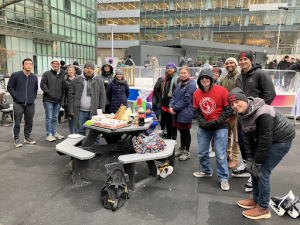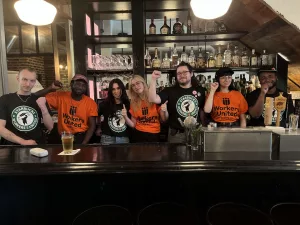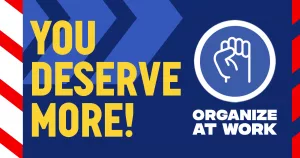Hint: If there’s free pizza, RUN.
Right now, companies like Starbucks are allowed to hold mandatory meetings with workers to spread anti-union misinformation. If the PRO Act passes on September 27th, that won’t be legal anymore.
This month, as Starbucks does everything in its power to crush a union drive—including sending managers into stores and hiring a union-busting firm, Littler Mendelson—the coffee giant is embracing the age-old tactic of holding “captive audience meetings.” These are mandatory meetings during which employees are forced to listen to anti-union rhetoric. Yep, they’re about as fun as they sound.
Why is the President of Starbucks North America, Rossann Williams, sweeping our floors in Buffalo? Our floors are fine — clean up your anti-union campaign. pic.twitter.com/IbZaOmIv8f
— SBWorkersUnited (@SBWorkersUnited) September 16, 2021
Captive audience meetings were once illegal in the U.S., precisely because they unfairly sway the results of union elections. One study found that when employers held these meetings, union drives won only 47% of the time, compared to a 73% win rate when the meetings weren’t held. That explains why employers held captive audience meetings in 89% of the union elections the study looked at.
The good news? If the PRO Act passes in Congress next week, these meetings will once again be illegal. Join us in calling Congress before September 27 to support the PRO Act, so we can help stomp out these toxic abuses of employer power. In the meantime, if you’re ever wondering whether you’ve been herded into a captive audience meeting, just look out for these six telltale signs.
1. Your boss has called a mandatory meeting for employees
Maybe your boss has just learned that you and your co-workers are starting to organize for a better workplace. In response, they’re requiring you to attend an “information session” designed to give you “all of the facts.” And now you have to sit here while your manager explains why organizing to form a union is a VERY BAD IDEA.
Sorry to say, but you’re definitely in a classic “captive audience meeting.” These meetings are a key component of the misinformation campaigns that employers use to discourage workers from organizing and taking back power.
2. It’s a pizza party!
NOPE. FALSE. Just because there happens to be free pizza at this meeting does not make it a party. This gesture from the boss is an attempt to butter you up and keep your mouth busy with the act of chewing while they rant about the dangers of forming a union. Don’t be fooled! (But do enjoy that free slice.)
After you’ve had your fill of free pizza, ponder this: the U.S. is the only industrialized democracy that has refused to sign a UN charter requiring states “to take all necessary measures to ensure workers and employers may exercise freely the right to organize.” So it should come as no surprise that captive audience meetings are par for the course here and nowhere else. But if we pass the PRO Act, we would join the majority of other industrialized democracies that treat these “pizza parties” as “impermissible employer coercion in employees’ exercise of their right to self-organization.”
3. They’re telling you that unions will deprive you of a voice.
This is a lot like telling you that up is down, black is white, and, to channel George Orwell for a moment, war is peace.The very magic of a union is that it empowers workers to speak with one united voice.
Having the power of a union behind you means that you don’t have to go it alone. You get to vote for your union reps, who are responsible for bringing your collective demands to your employer and negotiating on your behalf. When you and your co-workers do raise your voice, management will be forced to listen and respond.
But you’re not going to be reminded of such things during these meetings. Indeed, their coercive nature and their interference with free choice in union elections helps explain why they used to be illegal. It also explains why, once conservative judges decided to make them legal, union representatives were allowed equal time during the meetings to counter employers—that is, until even more conservative judges decided employers could ban union representatives from the meetings.
4. Your boss is warning you that you’ll have to pay union dues.
It’s true that union members often have to pay membership dues (though “right-to-work states” encourage workers not to). But you’ll get the value of your dues back, and then some, when you have the muscle of a union to negotiate for higher wages and better benefits on your behalf.
How much value, exactly? Unionized workers earned 22% more than their non-union counterparts in 2009, after controlling for demographic, geographic, and labor market factors, according to an analysis by labor sociologist Jake Rosenfeld.
Estimates of the union benefits bump aren’t easy to find. But a report from the Bureau of Labor Statistics suggests that it is much higher than the wage bump. In 2011, employers shelled out twice as much per employee in benefit costs for unionized workers as they did for non-union workers, according to the report.
Another report from the Economic Policy Institute (EPI) offers further insight into the perks of union membership. In the era of COVID-19, it feels especially relevant to point out that 95% of unionized workers have access to employer-provided health benefits, compared to just 68% of non-union workers. And 93% of unionized workers have access to paid sick days, compared to 75% of their non-union peers.
5. They’re hinting that you might lose what little you have.
Your boss is claiming that if you and your co-workers unionize, management might be forced to reevaluate pay, work schedules, and what little benefits you have today. Does this sound like a threat to you? “It’s totally not a threat,” management might be saying right now.
The truth is, management can re-evaluate your pay, work schedules, and benefits anytime they please. And without the backing of a union, you’ll continue to be at the mercy of your employer.
6. They suddenly identify as a member of your family.
“We’re a family,” your boss might be telling you at this meeting, in an attempt to make you feel guilty.
Wow, really? It’s interesting how your company only becomes a “family” when the boss is asking you to sacrifice your wellbeing for the company’s bottom line. It somehow ceases to be a family when you’re asking the company to sacrifice a portion of profits for the safety and wellbeing of its workers.
Of course, your boss might not be using the word “family.” They might call you a “team” instead and invoke touching metaphors of passing the ball, sportsmanship, personal sacrifice, etc.
In short, don’t be intimidated or misled by management’s cynical attempts to manipulate you through captive audience meetings. The value of forming a union to meaningfully improve your workplace is worth a whole lot more than a free slice of pizza. Even with extra cheese.
Join us in making calls by September 27 to fight for the PRO Act!
Join us in making calls to Congress by September 27 to ensure the passage of the PRO Act, which will make captive audience meetings illegal. The pressure over the last few months is working– new language in the budget reconciliation bill includes some provisions from the PRO Act.
To find out more about how bosses try to discourage workers from organizing—and how to fight back—check out EWOC’s short video, “Inoculation and the Boss Campaign.”
Want to read more about the PRO ACT? Check out this article.




